Did you know that 70% of wealthy families lose their wealth by the second generation?
It’s absolutely shocking.
In this episode I share behind the scenes of the horrors I went through after my father passed.
If you have children, and you care about their well being, you will want to hear this episode because I share with you all the painful lessons I learned the hard way, so you don’t have to.
I share it because more parents and children need to have this information, and I’m finally ready to share…
Thankfully our client and friend Tim Yurek was there to discuss as I break down the details.
You’ll discover:
-How to safeguard your legacy–the biggest mistakes families make
-The 5 most painful lessons I learned the hard way, so you don’t have to
-How to create a legacy that lives beyond your lifetime
Tune in and we hope this conversation can guide you through securing the future of your legacy.
Continued Learning: The Legacy That Never Should Have Happened
- Want to know what’s keeping you from doubling your sales in the next 12 months? Take our quick QUIZ to get answers: Howtodoublesales.com
- If you’d like to have a profound breakthrough in your business, schedule your breakthrough call with a LIVE expert here: Chetholmes.com/Breakthrough
- Claim your FREE chapter 4 from the top 10 most recommended marketing and sales books of all time! Visit: Ultimatesalesmachine.com to find out how you Create 9X More Impact from every move you’re already making to win clients!
TRANSCRIPT:
*this transcript was mostly generated by AI, please excuse any mistakes 
TIM: [00:00:00] Hello. It is my honor to introduce our guest of honor, Amanda Holmes from Chet Holmes international. She’s the coauthor of the ultimate sales machine named Chet Holmes international has helped over 250, 000 businesses achieve billions of revenue.
Amanda, it is our. Extreme pleasure to have you here today.
Amanda: Oh, it’s such a wonderful thing to be here. Thank you so much, Tim.
TIM: So Amanda, I know you have something special for us today. So if you would can you, do you mind sharing that with us?
Here is your daily dose of the ultimate sales machine coming to you from the new edition, visit ultimate sales machine. com to get your copy or multiple copies. I am your host, Amanda Holmes, CEO of Chet Holmes international. What you’re about to learn has assisted a quarter of a million businesses to generate billions of dollars working faster, better, smarter.[00:01:00]
Amanda: I do. So when we talked about this a while ago I had actually done a keynote that I thought was very relevant to the people in your world. The five things that I wish my father had told me about his legacy that could have saved me seven years of heartache. So I shared it once in front of an audience and I thought it might be good to share it again with your audience because I made and my family made every mistake in the book.
And I thought it might be nice to just say, hey, here’s everywhere that I did wrong so that you don’t have to. Does that sound like a good thing to go through for your
TIM: my gosh. That would be of such value to our audience. Absolutely. Thank you.
Amanda: Okay, great. On the other side, so I don’t normally teach anything of that sort, please go to Tim and Tier 1 Capital for anything that has to do with legacy and creating multi generational wealth. My side is more [00:02:00] on sales and marketing and growing your business. Our company has created 70 different training programs, selling in over 100 countries, ultimate sales machine, like what?
Tim had mentioned is translated into 16 different languages. We’ve worked with 85 of the Fortune 500 and as he said, 250, 000 businesses.
My father got diagnosed with cancer, which I know is a very It is a family disease, as the doctors told us.
One in every three males in the United States today will be diagnosed with cancer, and one in every two women.
So I know that this journey is not just my own to bear. I know many of you have had it yourselves.
And my father actually spent 352 nights in the hospital and never once.
So each, he never spent a night alone.
It was between me and my mom and my brother. And never once did he sit me down and say, here are my bank accounts.
Here’s all of our real estate. Here’s the paperwork for my properties.
Here are the people who manage my stocks. hey, your mother won’t know [00:03:00] where all the bills are.
I’m having my accountant locate them.
We were knocking on death’s door for a year and a half, and we never had those dialogues.
It was shocking. And it took me five years to understand just the basics of trying to understand my family’s estate.
So that was just our family trust, not to mention for the business. He never told me what businesses he had, who ran each business, his dreams for the business, what the PNL looked like.
I actually had to hire several CFO consultants to understand our books cause I didn’t, Understand what was going on. I was just thrown into this and at the time I was a singer songwriter I had just released my fourth record. It was just such a Garbage fire. I don’t know what you call it.
So the first thing that I Ask people, because very often I have friends now, that if they’re in a similar situation where the kids have a very high profile [00:04:00] parent and, they’re a high powered executive and they’re sick, very often I’ll talk to them and I’ll just say, Have you written down your plan?
Who have you told? Because just these two things we missed. And my father, seven years later, I found out that my father actually did tell people. He told a cousin that cousin had never shared that stor the plan that he had with me. He never thought that was important, even though I had taken over all of that responsibility.
And he told his best friend that also didn’t share with me, and I was the one that was managing it. He found it easier, to share it with people. But never tracked that back to me. Tim, do you find that’s very common?
TIM: It’s incredibly common and in, in fact, so these are things, it’s funny, the founder of a business is so focused on growing that business that they very rarely have time for, to do things for [00:05:00] themselves. And what we have found is 64 of business owners want to pass the business on to the next generation.
And yet here’s the disconnect, only 18 actually have a documented plan. That’s been communicated to the people involved.
So again, they’re so focused on growing that business and working that business that they don’t get an opportunity to do the things or have those conversations, whether they’re difficult conversations or, advisable conversations.
Amanda: So go to Tim for that. I’m just going to continue to tell you how you can do everything wrong with your estate.
TIM: Amanda, let’s, if you don’t mind, let, I know you talked about some of the pain that, that you’ve gone through, but I know there’s a lot more,
Amanda: I’m going to go into detail right now.
You want to hear it?
Let me walk you through like exact mistakes. [00:06:00] Because I have never heard anybody talk about it this way. I think it’s fascinating that I had all of these people around me and yet nobody thought that it would be good to educate me.
I was sitting for hours bored on the cancer floor. I had nothing to do. My private banker didn’t tell me. Our stock portfolio manager didn’t say anything. Our financial aid in the hospital just kept coming around and they didn’t have Anything to start a conversation or say have you had that dialogue or here’s something to think about my family trust lawyer didn’t say anything Our insurance company didn’t say anything friends didn’t say anything family didn’t say anything Literally all of these people around watching this happen and nobody felt that I might be in a dire need, right?
The same, and my father as well. And this is where businesses fail is that we get so stuck on what we’re selling that we forget that our prospects are experiencing pain and they need solving. So for everybody that’s listening to this, that’s a business owner, [00:07:00] I put down a note, who are the people that are in so much pain because I am not there.
Find those people and find a way to educate them.
And I’ll share about that in a minute, but I just, that’s such an important piece that we just fail to recognize that if we came from a place of service and being an expert, we can actually serve way more people than just trying to sell them something.
So here are the most painful lessons that I learned the hard way. And they’re brutal. First one was, your staff will leave at any time. So my father said, this, these few people will never leave the company. Somebody had actually questioned him in front of me shouldn’t you be sharing these things with your daughter?
And he said, never in a million years would this person leave. And that one person that hold the keys, that one person actually said these words to me, I know where the bodies are buried.
That was the words that they used, and I went, Oh my god, and yet, I never found out where the [00:08:00] bodies were buried. So it was as if I had an acre’s worth of land, and I’m just sitting here digging holes trying to find something.
I’m reading his emails. To try and understand who he liked in the business, who he didn’t, how he worked, how he operated, because I couldn’t trust the people in the organization. They weren’t telling me the truth. They were just trying to, butter me up to get in on my good side. Staff will leave at any time.
I’m going to go through two more and then I’m going to call you out, Tim, because I want you to speak to this.
Oh, you want to speak to me right now?
TIM: let me make a point on that first one, right? We have a very prominent person in our community who got involved with some things and ended up having to go to prison and while he was there, the people that he was entrusting to run his business ended up like leaving his business and starting their own company like he, he was depending on them to run the business and they basically, Did a backdoor deal on him and, it [00:09:00] was, it’s incredible.
Now, he’s back on his feet, but that’s not the issue. The issue is, to your point, Amanda, your staff will leave you at any time for their convenience.
Amanda: And you think that they won’t. No, no way! They’ve been with me for two decades. Well, mine left.
Beware of ambulance chasers. This one’s a terrible one, but we started noticing that people that weren’t really around my father very often started coming around when he started going to the hospital more. And yeah.
I could say a lot on this topic, but I’ll probably just go to the next one unless you this, Tim.
TIM: No, I think the point is made.
Amanda: Yeah. Number three. Turn your handshake deals into reliable contracts. This could have been easily avoided, but it took me… I had several lawsuits that were so difficult for me to have because I was not the one that made the deal that did the handshake, my father made majority of his business relationships on a handshake deal.
[00:10:00] And that lasted, he was very loyal to his staff and they were supposedly loyal to him, but when he was no longer there to uphold that, and here I am. I’m not the barracuda businessman that my father was, but I had to learn very quickly how to protect my family. My mother and I in very serious depositions and, the gambit, I really had the gambit there. Anything you want to say on that?
TIM: yeah, so here’s the deal, right? So here, let me so as as, as difficult as it was having to deal personally with the loss of your hero, right? You’re everything, your father, right? Having to deal with that, taking over his business, trying to put all these pieces together. Then you’re dealing with people that, all right, you’re down and they’re just kicking you.
So talk about the pain, the psychological the emotional pain that creates.
Amanda: I ju I used to joke a lot, but I [00:11:00] don’t think it’s so funny, so I stopped. But I kept saying I should have been in a white padded room because it was maddening.
The amount of stress, I couldn’t I lost a ton of weight, which I’m not really an overweight person, because the stress was so hyper that I couldn’t eat.
My stomach just tensed up. I call it micro panic attacks. Like I was perpetually all day long in a panic attack. I could not catch my breath. It was just perpetually, it just felt like I, this terror inside me. And sleeping was really difficult cause I still had these images of my father in the hospital.
So I was having nightmares. So I would go out to my car and I would drive around at night and just Park on the sides of the road in L. A. So I could sleep long enough to have an hour sleep, but then I’d get woken up because my legs would fall asleep. And it would start sending like these, when your legs fall asleep, you get those pins at the bottom of your feet.
So it would burst me awake and I would be able to [00:12:00] wake up.
That’s why I’m such a big advocate of mental health, because if I didn’t have my spiritual side, so I study under a guru and heard nonprofit is divine bliss international. If I didn’t have that outlet and those tools to manage my emotions, my grief and everything that was going on to be present in the now, even though it felt like the world was caving under and I was 50 feet underwater.
I, we wouldn’t be here today.
Okay, I’m gonna keep going, I have so much. I’m so glad that you actually understand this, and this is like your world, which is fascinating to me, because I really needed you. I needed you, Tim!
Some questions that my limited knowledge would ask somebody, but just because I’ve been through the ringer, do you have a file somewhere with all of your paperwork, your deeds, your statements, because we didn’t.
And we lost a timeshare because of it. It was just not in the right it wasn’t in the trust, it was still in my father’s name, and we didn’t have the paperwork, so we lost that asset. [00:13:00] Do you have a plan written down if you were to pass? How many people have you shared that with? We didn’t have that so clearly, and it was very old.
Have you started educating your family about your legacy?
I went to an event with DLP Capital, and this man had like his whole plan, and everybody was educated on it, and he has videos and trainings on his legacy, It was remarkable to me. I actually cried during his keynote because I was so shocked at how thorough he was.
Have you started teaching them financial literacy? My father came from nothing. He, when he started his first business, him and my mother didn’t have enough money to pay for milk and cereal. So they ate their cereal with water and they, and he had a karate studio in the middle of the Bronx where you had to know karate just to get to that studio.
And he. He really struggled. He told me once that was where he learned how to work hard was when he first started that first karate studio. And since he grew up like that, when I was growing up, he [00:14:00] kept saying, I have worked my butt off my entire life so that you will never have to think or worry about money.
So when I then inherited. And an estate, and a P&L with millions of dollars on it. I was so far from understanding that. Just even the basics. I, as much as you are proud maybe that you have been that first generation that made it to a million and beyond, it doesn’t mean that you shouldn’t teach that to your children.
Please do. I’m sure you could talk a lot about that. I’ll do two more and then I’ll open it up to you, Tim. Do you have a trusted advisor in your corner that can help you? I had a lot of them, but I just didn’t know who that should be. I was very confused. And then I even, the one time that I shared this before, I said, I would recommend Tier 1 Capital if you need help, because, man, you guys do a world class job and people should know about that.
TIM: And that’s a good point, right? We don’t do [00:15:00] everything, but we can coordinate so we could be the quarterback of that planning team. And that is so important because somebody has to take the lead and it’s amazing. We had a local business that had been in business over 50 years. It was in the third generation.
It was in the second generation. The third generation was poised to take over and when the father died, he had done no planning. He was represented by one of the leading business business law firms in our area. Represented by probably the top accounting firm in the area. Had access to some of the best financial advisors in the area.
Nobody touched this issue. So when dad died, the founder… Everything went to mom. Mom never set foot in the plant. There was over 150 employees in that business. And then when mom died, there was, [00:16:00] they had to come up and pay eight and a half million dollars of estate taxes. They didn’t have the money for it. So what they did was they borrowed the money and everything was good until the financial crisis hit business. Went to almost zero. They didn’t have enough money to pay the debt. They went bankrupt. So not only did the two sons who were running the business, and they were in their 60s at the time, not only did they lose their livelihoods, their children, five boys, were gonna take over.
They lost their jobs, had to start over anew. And they, by the way, were in their 30s, and they had families. And But then over 150 people lost their jobs.
Amanda: Oh my
TIM RAW: And here’s the deal. Nobody had the conversations, nobody took the lead and nobody did the things that had to be done in order to create the certainty going forward.
Amanda: That is a great segue into, again, you make it feel so [00:17:00] much more normal that yes, this happens every single day and people don’t know about it. At the time I was the only person, I, okay, in sixth grade math class, I would walk by this one poster on the wall every day and it said, Cleopatra ran Egypt at the age of 18.
What are you doing? And I always used to laugh at it and I’d go one day I’ll rule an empire. Little did I know. And that. Poster hit me every single day, and little did I know that by 24, I would actually inherit an empire, and I would have no idea what to do with it. And just nobody my age was in that scenario.
I just kept saying, can someone guide me to where I need to go? I don’t know who to talk to, I don’t know what to do here. There is nobody that I know that’s in this scenario. So it was a very strange thing for me. Okay, so then Four biggest reasons that families fail in multi generational wealth.
I just
had no idea. I’m sure they could get much better resources from you, but here’s what the [00:18:00] research that I found said, is just poor financial management. Families don’t manage that finances very well. Lack of communication and transparency within the family, which I 100 percent experienced. My father wanted to protect me from it, but the protection left me completely void of any knowledge on it.
Conflict over inheritance and distribution of assets. Luckily, I didn’t really have to deal with it. With that, other than in the business, it was a total nightmare, but yeah. At least my family, we didn’t get divided, which I know is something that you probably deal with every day. And then failure to adapt to changing economic and political conditions.
So those were the four biggest reasons that families fail in multigenerational wealth. Anything you want to add to that, Tim?
TIM: Yeah. The lack of communication is big because. Thing I, I was talking to a gentleman the other day, and he was telling us how growing up, his biggest concern now is he’s accumulated a lot of money. He’s in his mid [00:19:00] forties. He and his wife have done a tremendous job, but they wanna communicate to their children
Value and like the, what they’ve done to, to create this money, to accumulate it, and they want to hang onto it so that this next generation doesn’t.
Waste it or spend it, frivolously. But what he said, and this is such a great point. He said, when I was growing up, the last thing we talked about around the dinner table was money. That was, and this was his word that talking about money was taboo with children.
And he said, I don’t want to do that. So we’ve always included our kids. With, in everything, like every big move that we’ve made right from the beginning, we’ve included our children, which is really awesome.
Amanda: That is awesome. I had a similar thing, or we just did not, other than my father just being obsessive about did you turn off the lights in the house, he would [00:20:00] freak out, he’s you’re just wasting my money, my hard earned money on keeping the lights on, it was like one of his nervous tics, that he couldn’t stand that, but
TIM: no, listen, I,
Amanda: We really didn’t talk about, like, how he was running his business or how we invested in different assets none of that.
We didn’t get any of that. So I love that he shared that with his family. That’s so good. . Here are just from my wounded experiences creating a business. that lives beyond your lifetime. This is, if I had looked back and if I could give some advice from the devastation that I experienced in the last decade since, the first thing I would say is teaching your next generation how to think, not what to think. I found that as I, I’ve been to a lot of legacy events over this last year, cause I’m keynoting at them. There’s a lot of. Real estate that I’ve been invited to and I’ve seen the parent of them of the legacy saying This is what I want them to understand [00:21:00] and it just felt like there’s no room for interpretation if you give them the tools to be able to discern Then they’ll be able to make the right decisions.
Cause that was a huge part of my journey on the nonprofit divine bliss side is I got tools for how to make decisions, better decisions and how to trust myself and go inward for my answers, which has helped me innovate the company. Since my father passed, we didn’t have an innovator in the company.
Everyone, my father was the innovator and everyone just followed his innovations. So I became that innovator because I was able to think of the concepts and have a framework for how to make decisions. So that, that I think is critical. As well as and this one was another controversial one that I’ve seen a lot.
Do you have family core values? And for me, a huge learning leap for me has been that my core values are not similar to my father’s [00:22:00] core values. So thinking that you can create core values that will always be your children’s core values, unless you maybe involve them in that process. I, the whole culture of my father’s business is night and day different from how my culture is today.
A phrase, and I think it’s also just the changing of time. How we market and sell over the last decade has changed dramatically. A phrase that used to be said very often a decade ago was staff would say something like you eat what you kill. Because there were a lot of sales reps that were on commission only, and I am appalled by that phrase.
I am a lover. So it was very strange for me to hear this. And what it created was a fairly vicious competitive nature. I have competitiveness within my organization. I’m extremely competitive, but I will do it lovingly. And I’ve found that I’ve had to adapt an organization that is more. [00:23:00] Oriented in community because I had to lean on other people around me because I didn’t have the experience that I needed to lead.
But I knew that if I got a good group around me that we’d be able to do it together. So it was less about who’s gonna make the most, when, and when can I take my opportunity and seize it and knock others down. It was more about how do we lift our collective which I’m very grateful for. Every step of the way, I felt like I was breaking down the infrastructure of what my father created in that culture that led to his success, but wouldn’t lead to mine.
Anything you want to say on this? Because this is a really big learning for me, Tim.
TIM: so I could give my take on the culture. I don’t think the culture or the values of CHI, Chet Holmes International has changed. I think your dad. Was a highly valued person, was a highly, he had a lot of core values, but I think the issue was, and we talked about it earlier today in the workshop, is that[00:24:00] he was more direct, whereas I think the culture of your company is more coming from a standpoint or a position of service, not that your dad wasn’t coming from a position of service because he was direct because he was damn good at what he did.
And he wasn’t afraid to let you know that he was very good at what he did,
Amanda: Yeah.
TIM: but, and I love that one story and I’ve heard, I’ve watched videos of your dad where he called somebody and the guy hung up on him. He called him back. He says, nobody hangs up on me. And he, that, that individual, I think not only became a client, was a very trusted, good, trusted friend of your dad’s, right?
Amanda: Yes
TIM: yeah. So I don’t think that the culture has changed. I think what has happened is the methods are changing because society has changed, for sure.
Amanda: So something that we taught within the company and we still do is doubling sales, right? We have 12 core [00:25:00] competencies on how to double sales, but for me. I, it’s not worth it to me to double sales if it’s at the expense of your family or your health.
And there’s this one stat that just haunts me that the average CEO loses five years in life expectancy compared to the average person. And that lands for me because my father died at 55. So I changed our driving goal from just doubling sales to, I want you to double your sales while cutting your stress in half.
So everything I do is about how can we make quantum leaps with every step we’re making being smarter while still being mindful of, at the end of the day, we can’t be working half days every day, 12 hour days. So I add that into what I teach. Like in a keynote, if I’m teaching sales training, I’ll take people through meditation in the middle of it.
Cause that to me is just as important in the success as the doubling sales piece.
TIM: Oh, [00:26:00] absolutely.
Amanda: you’ve seen a little bit of that.
TIM: Yes.

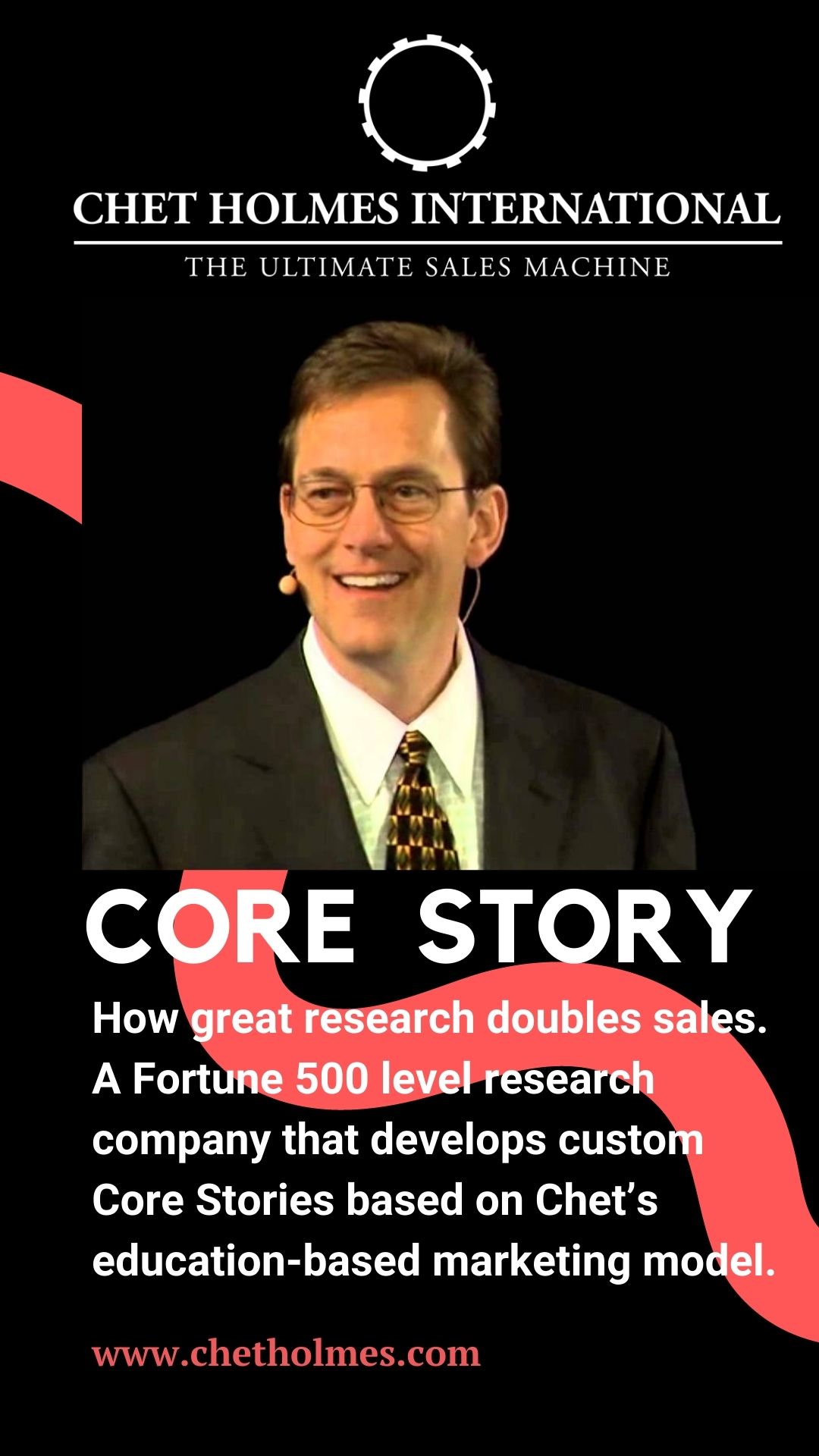
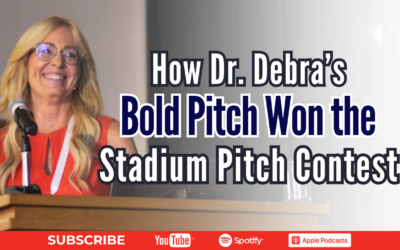
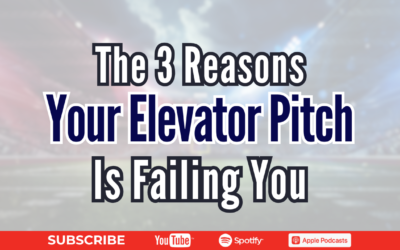
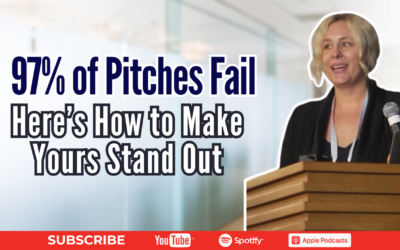
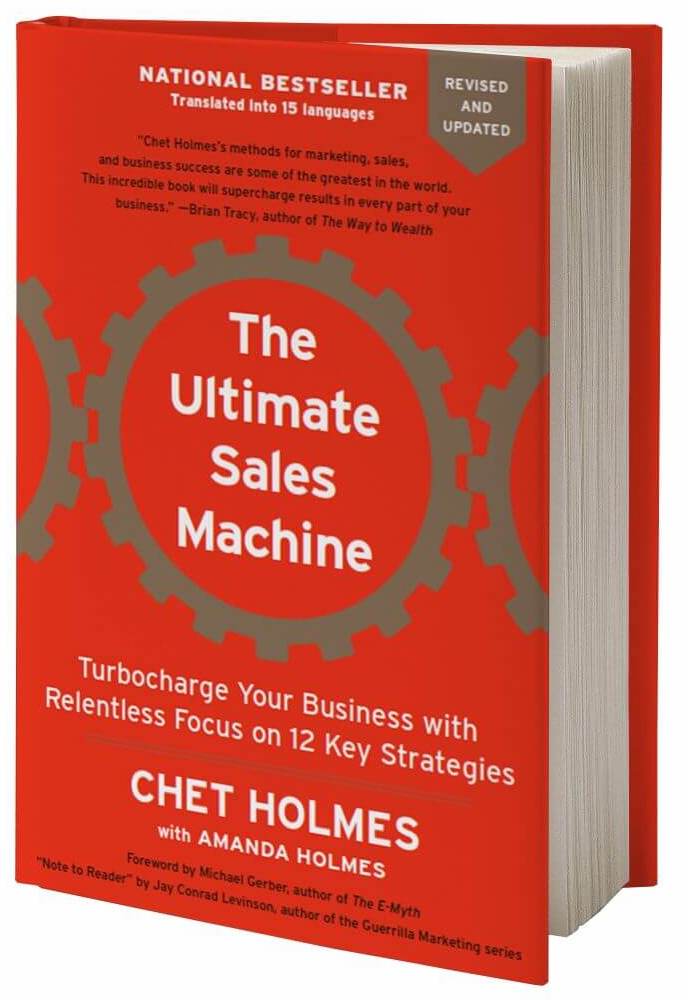 Get your pre-sale copy of the new edition of The Ultimate Sales Machine! (With special limited time bonuses)
Get your pre-sale copy of the new edition of The Ultimate Sales Machine! (With special limited time bonuses)
0 Comments